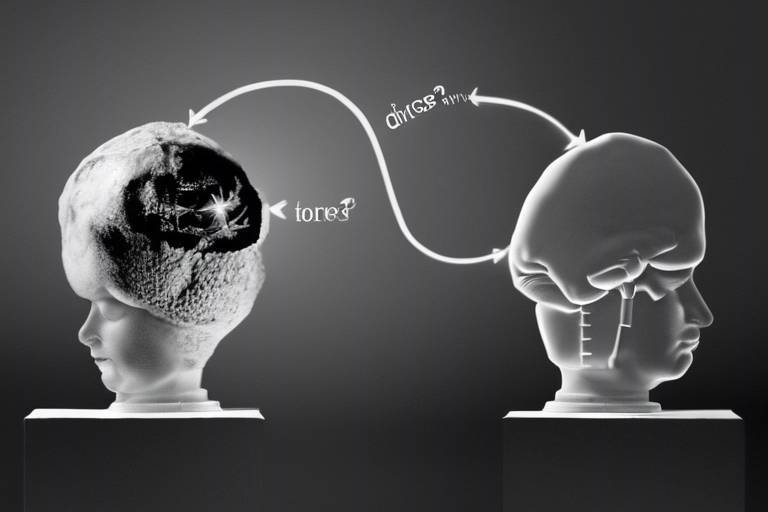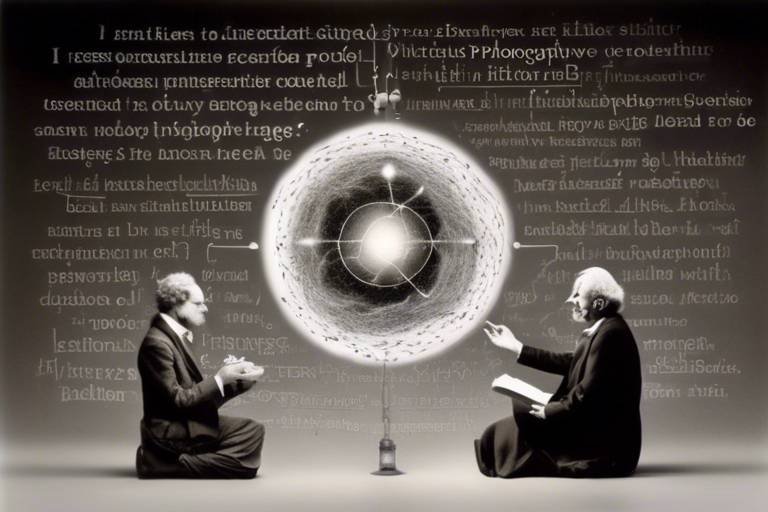The Influence of Philosophy on the Formulation of Scientific Laws
Have you ever wondered how the intricate dance between philosophy and science shapes our understanding of the universe? It's a fascinating relationship that has evolved over centuries, where philosophical inquiry acts as a guiding star for scientific discovery. Throughout history, **philosophers** have not only pondered the nature of existence but have also laid down the essential frameworks that underpin scientific laws. This article dives deep into the rich tapestry of ideas that connect these two fields, illustrating how philosophical concepts have influenced the formulation of scientific laws.
To grasp the full impact of philosophy on science, we must first look back at its historical roots. The origins of philosophy can be traced to ancient civilizations, where thinkers like **Socrates**, **Plato**, and **Aristotle** laid the groundwork for rational thought. These early philosophers were not merely speculators; they were the pioneers of systematic inquiry, seeking to understand the world through reason and observation. Their ideas served as a springboard for later scientific thought, influencing key figures such as **Galileo** and **Newton**, who would go on to formulate laws that govern our understanding of motion and gravity.
As we explore the interplay between philosophy and science, several key philosophical concepts emerge that have significantly impacted scientific inquiry. Here are a few of the most influential:
- Empiricism: The belief that knowledge comes primarily from sensory experience.
- Rationalism: The idea that reason and logic are the primary sources of knowledge.
- Skepticism: A critical approach that questions the validity of accepted beliefs.
These concepts have not only shaped scientific methodologies but have also led to the establishment of **scientific laws** that we rely on today. For instance, empiricism emphasizes the importance of observation and experimentation, which are fundamental to the scientific method.
Empiricism serves as the backbone of scientific methodology. It champions the idea that knowledge must be grounded in observable phenomena. This approach has revolutionized how we conduct experiments and gather data. By prioritizing direct observation, scientists have been able to formulate laws that are not just theoretical but are backed by tangible evidence. Think about it: without the empirical approach, would we have been able to discover the laws of thermodynamics or the principles of electromagnetism?
Inductive reasoning plays a crucial role in the formulation of scientific laws. It involves deriving general principles from specific observations. For example, observing that the sun rises in the east every morning leads us to formulate the general principle that the sun always rises in the east. This process of induction is fundamental to how we build scientific knowledge. However, it’s not without its challenges.
Despite its strengths, empirical methods face criticisms. Some philosophers argue that relying solely on induction can lead to **fallacies**. For instance, just because something has happened consistently in the past does not guarantee it will happen in the future. This skepticism raises important questions about the validity of scientific laws and whether they can ever be truly universal.
On the flip side, we have rationalism, which emphasizes reason and logic as the primary sources of knowledge. This philosophical approach has significantly influenced scientific theories, providing a counterpoint to empirical methods. Rationalists argue that some truths can be discovered through logical deduction rather than through sensory experience. For instance, mathematical principles, which form the foundation of many scientific laws, are often derived through rational thought rather than empirical observation.
Throughout history, major scientific revolutions have been deeply intertwined with philosophical thought. Take the **Copernican Revolution**, for example. When Copernicus proposed that the Earth revolves around the sun, it was not just a scientific breakthrough; it was a philosophical shift that challenged the very way we perceive our place in the universe. Similarly, the **Newtonian Revolution** redefined our understanding of motion and gravity, influenced by the rationalist ideas of his time.
The philosophy of science serves as a critical lens through which we examine scientific practices and methodologies. It encourages scientists to reflect on the underlying principles that guide their work, questioning not only what we know but how we know it. This self-reflection is essential for the evolution of scientific thought, ensuring that we remain open to new ideas and discoveries.
Today, philosophical discussions continue to shape the landscape of scientific inquiry. Debates surrounding the nature of scientific laws, their universality, and the implications for scientific practice are more relevant than ever. As we advance in technology and our understanding of the universe, these discussions will undoubtedly influence future scientific discoveries.
- How does philosophy influence scientific laws? Philosophy provides the foundational concepts and frameworks that guide scientific inquiry, shaping how scientists formulate and understand laws.
- What are the main philosophical concepts that impact science? Key concepts include empiricism, rationalism, and skepticism, each contributing to different aspects of scientific methodology.
- Why is induction important in science? Induction allows scientists to derive general principles from specific observations, forming the basis for many scientific laws.

The Historical Context of Philosophy and Science
Throughout history, the relationship between philosophy and science has been a complex and dynamic one, marked by a series of transformative ideas and influential figures. The origins of philosophy can be traced back to ancient civilizations, where thinkers began to question the nature of existence, knowledge, and the universe. This intellectual curiosity laid the groundwork for what would eventually evolve into the scientific method we recognize today.
In ancient Greece, philosophers such as Socrates, Plato, and Aristotle made significant contributions to early scientific thought. For instance, Aristotle's empirical observations of the natural world not only influenced the development of biology but also established a framework for systematic inquiry. His emphasis on categorization and logical reasoning became foundational to scientific classification and methodology.
Moving forward in time, the Renaissance marked a pivotal shift in the interplay between philosophy and science. This era was characterized by a revival of classical knowledge and a burgeoning interest in empirical observation. Thinkers like Copernicus and Galileo challenged long-standing philosophical doctrines, proposing revolutionary ideas about the heliocentric model of the solar system. Their work exemplified how philosophical inquiry could lead to groundbreaking scientific discoveries, fundamentally altering humanity's understanding of its place in the universe.
Furthermore, the Enlightenment period brought forth a wave of rationalist thought, with philosophers such as Descartes and Locke advocating for reason as the primary source of knowledge. This era also saw the emergence of the scientific method as a systematic approach to inquiry, emphasizing observation, experimentation, and the formulation of laws based on empirical evidence. The interplay between rationalism and empiricism during this time set the stage for future scientific advancements.
As we delve deeper into the historical context, it is essential to recognize the contributions of various philosophical movements, each shaping the trajectory of scientific thought. The table below highlights some key figures and their contributions to the relationship between philosophy and science:
| Philosopher | Era | Contributions |
|---|---|---|
| Socrates | Classical Greece | Encouraged critical questioning and dialogue. |
| Aristotle | Classical Greece | Developed empirical observation and classification. |
| Copernicus | Renaissance | Proposed the heliocentric model of the universe. |
| Galileo | Renaissance | Emphasized experimentation and observation in science. |
| Descartes | Enlightenment | Promoted rationalism and deductive reasoning. |
In summary, the historical context of philosophy and science reveals a rich tapestry of ideas and discoveries that have shaped our understanding of the natural world. As we explore the philosophical concepts that have influenced scientific inquiry, it becomes clear that the relationship between these two disciplines is not merely one of influence but rather a collaborative evolution that continues to unfold.
- How did ancient philosophy contribute to modern science? Ancient philosophers laid the groundwork for scientific inquiry by emphasizing observation, logic, and critical thinking.
- What role did the Renaissance play in the development of science? The Renaissance revived classical knowledge and encouraged empirical observation, leading to significant scientific breakthroughs.
- Why is the relationship between philosophy and science important? Understanding this relationship helps us appreciate how philosophical ideas shape scientific methodologies and discoveries.

Key Philosophical Concepts Impacting Science
When we delve into the world of science, it's impossible to ignore the profound influence of philosophy on its evolution. Philosophical concepts serve as the backbone of scientific inquiry, guiding researchers in their quest for knowledge and understanding. Among these concepts, three stand out as pivotal: empiricism, rationalism, and skepticism. Each of these philosophical frameworks has played a significant role in shaping the methodologies and principles that underpin scientific laws.
Let's start with empiricism. This philosophy posits that knowledge comes primarily from sensory experience. In the realm of science, empiricism emphasizes the importance of observation and experimentation. Think of it as the scientific method's best friend; without empirical evidence, scientific claims would be nothing more than conjecture. The rigorous process of collecting data through observation allows scientists to build theories grounded in reality rather than mere speculation. This reliance on empirical evidence has led to the formulation of many scientific laws that we accept today, such as Newton's laws of motion, which were derived from meticulous observation and experimentation.
Within the broader umbrella of empiricism lies the concept of induction. Inductive reasoning is the process of deriving general principles from specific observations. For instance, if we observe that the sun rises in the east every morning, we might inductively conclude that the sun always rises in the east. This method of reasoning is crucial in forming scientific laws, as it allows scientists to extrapolate findings from a limited set of data to broader conclusions. However, the reliance on induction isn't without its challenges, as we will explore later.
Induction plays a critical role in the scientific process. It enables scientists to create hypotheses and develop theories based on observed phenomena. For example, the discovery of the laws of thermodynamics emerged from countless experiments and observations regarding heat and energy. However, the inductive leap from specific instances to general laws can sometimes lead to errors, particularly when the observed data is limited or biased. This brings us to the criticisms of empirical methods, which question the validity of induction in establishing universal scientific laws.
Critics of empiricism often point to the problem of induction, famously articulated by philosopher David Hume. He argued that no amount of empirical evidence can guarantee that future observations will align with past experiences. For example, just because we've always seen swans that are white doesn't mean that all swans are white. This skepticism raises important questions about the certainty of scientific laws derived from empirical observations and highlights the need for a more nuanced understanding of scientific inquiry.
On the other hand, we have rationalism, which emphasizes the role of reason and logic in the acquisition of knowledge. Rationalists argue that some truths can be known independently of sensory experience. This philosophy has significantly influenced scientific thought, particularly in the development of mathematical laws and theories. For instance, the principles of calculus, formulated by Isaac Newton and Gottfried Wilhelm Leibniz, were derived through logical reasoning rather than direct observation. Rationalism provides a counterpoint to empiricism, suggesting that while observation is essential, it is not the sole pathway to knowledge.
In summary, the interplay between empiricism and rationalism creates a rich tapestry of thought that informs scientific practice. As scientists navigate the complexities of the natural world, they often find themselves oscillating between these two philosophical approaches, drawing on the strengths of each to advance their understanding. The evolution of scientific laws is not merely a matter of collecting data or applying logic; it is a dynamic process influenced by the philosophical underpinnings that guide inquiry.
As we continue to explore the intricate relationship between philosophy and science, it's essential to acknowledge how these key philosophical concepts not only shape scientific methodologies but also challenge our understanding of what constitutes knowledge itself.
- What is the main difference between empiricism and rationalism?
Empiricism emphasizes knowledge gained through sensory experience, while rationalism focuses on knowledge gained through reason and logic.
- How do philosophical concepts influence scientific laws?
Philosophical concepts provide frameworks that guide scientific inquiry, helping to shape methodologies and the interpretation of empirical data.
- Can scientific laws change over time?
Yes, scientific laws can evolve as new evidence emerges and our understanding of the natural world deepens.

Empiricism and Scientific Methodology
Empiricism is a cornerstone of scientific inquiry, emphasizing the importance of observation and experience in the acquisition of knowledge. It asserts that knowledge comes primarily from sensory experience, which forms the bedrock of the scientific method. Imagine trying to understand the world around you without ever stepping outside your door—how could you possibly grasp the complexities of nature? This is where empiricism steps in, urging scientists to observe, measure, and experiment to uncover the truths of our universe.
The scientific methodology, which is heavily influenced by empiricism, revolves around a systematic approach to inquiry. It typically involves several key steps:
- Observation: Scientists begin by observing phenomena, gathering data that sparks curiosity.
- Hypothesis Formation: Based on observations, researchers formulate hypotheses—educated guesses that can be tested.
- Experimentation: This is where the magic happens. Scientists design experiments to test their hypotheses, collecting data through rigorous methods.
- Analysis: After conducting experiments, scientists analyze the data to determine whether their hypotheses are supported or refuted.
- Conclusion: Finally, they draw conclusions based on the analysis, which may lead to new questions and further investigation.
This cycle of observation, hypothesis, experimentation, and conclusion is what separates scientific inquiry from mere speculation. Think of it like a detective solving a mystery; they gather clues, formulate theories, and test their ideas against the evidence. The reliability of scientific laws hinges on this empirical approach, making it a vital component of scientific methodology.
However, the reliance on empirical methods does not come without its challenges. One of the most significant criticisms of empiricism is the issue of inductive reasoning. Induction involves deriving general principles from specific observations, which can sometimes lead to erroneous conclusions. For instance, just because all observed swans are white does not mean all swans are white. This highlights the potential pitfalls of relying solely on empirical evidence without considering broader contexts or alternative explanations.
Furthermore, some philosophers argue that empirical approaches can be limiting. They suggest that not all phenomena are easily observable or measurable, particularly in fields like psychology or theoretical physics. This raises the question: can we truly understand the universe if we are confined to what we can see and measure? The debate continues, but the importance of empiricism in shaping scientific methodology remains undeniable.
In conclusion, empiricism serves as a guiding principle for scientific inquiry, fostering a culture of observation and experimentation. It encourages scientists to engage with the world around them and build knowledge based on tangible evidence. While challenges exist, the empirical approach is fundamental in the quest to formulate reliable scientific laws, pushing the boundaries of what we know and understand about our universe.
- What is empiricism? Empiricism is a philosophical approach that emphasizes knowledge gained through sensory experience and observation.
- How does empiricism influence scientific methodology? Empiricism forms the foundation of the scientific method, guiding researchers to observe, hypothesize, experiment, and analyze.
- What are some criticisms of empirical methods? Critics argue that reliance on induction can lead to incorrect generalizations and that some phenomena may not be easily observable.
- Is empirical evidence always reliable? While empirical evidence is crucial, it is essential to consider context and alternative explanations to avoid potential biases.

The Role of Induction in Science
Induction plays a vital role in the realm of science, acting as a bridge between specific observations and the broader generalizations that form the foundation of scientific laws. At its core, induction involves the process of reasoning from particular instances to arrive at universal principles. Think of it as piecing together a jigsaw puzzle; each observation is like a puzzle piece, and when we fit them together, we can see the bigger picture emerge. This method has been instrumental in shaping scientific inquiry, allowing scientists to formulate theories that explain natural phenomena.
To illustrate the significance of induction, consider how early scientists like Isaac Newton used it to develop the laws of motion. By observing the motion of falling apples and celestial bodies, Newton induced general principles that governed motion, leading to the formulation of his three laws of motion. This process of moving from specific observations to general laws exemplifies the power of induction in scientific discovery.
However, induction is not without its challenges. Critics argue that just because something has been observed to occur consistently in the past does not guarantee it will happen in the future. This is known as the problem of induction, famously articulated by philosopher David Hume. Hume questioned whether we could truly justify our reliance on induction, suggesting that it lacks a rational foundation. This philosophical skepticism raises important questions about the reliability of inductive reasoning in establishing scientific truths.
Despite these challenges, induction remains a cornerstone of scientific methodology. Scientists often rely on it to develop hypotheses that can be tested through experimentation. The cycle of observation, hypothesis formation, and subsequent testing exemplifies the iterative nature of scientific inquiry. For instance, if a scientist observes that a specific chemical reaction occurs under certain conditions, they may induce that the reaction will also occur under similar conditions in different scenarios. This ability to generalize from specific instances is what drives scientific progress.
Moreover, induction is not merely a tool for forming scientific laws; it also serves as a mechanism for refining those laws. As new observations are made, existing theories may be adjusted or even overturned in light of new evidence. This dynamic process underscores the importance of induction in fostering a scientific mindset that is open to revision and improvement. In this way, induction acts as both a foundation and a catalyst for scientific advancement.
In conclusion, while the role of induction in science is pivotal, it is accompanied by philosophical debates that challenge its validity. As scientists continue to navigate the complexities of the natural world, the interplay between observation and generalization will remain a fundamental aspect of scientific inquiry. The journey from specific observations to universal laws is not just a process; it is a continuous dialogue between the known and the unknown, a dance of discovery that propels humanity's understanding of the universe forward.
- What is induction in science? Induction is a reasoning process that involves drawing general conclusions from specific observations.
- Who criticized induction? Philosopher David Hume is well-known for his critique of induction, questioning its reliability in establishing universal truths.
- How does induction impact scientific discovery? Induction allows scientists to formulate hypotheses and laws based on observed patterns, driving scientific progress.
- Is induction always reliable? While induction is a powerful tool, it is not infallible; past observations do not guarantee future occurrences.

Challenges to Empirical Approaches
The reliance on empirical methods in science has undoubtedly propelled humanity's understanding of the natural world. However, this approach is not without its challenges and criticisms. One of the most significant critiques comes from the realm of philosophy, where thinkers have raised questions about the very foundations of empirical inquiry. For instance, the principle of induction—the process of drawing general conclusions from specific observations—faces scrutiny. Critics argue that just because something has been observed repeatedly does not guarantee that it will always hold true. This is often illustrated by the classic example of the "black swan." Before the discovery of black swans in Australia, it was a common belief that all swans were white. This case highlights the potential pitfalls of relying solely on inductive reasoning to formulate scientific laws.
Moreover, some philosophers, such as David Hume, have pointed out that induction lacks a rational basis. Hume famously questioned how we can justify the leap from observed instances to universal laws. He suggested that our belief in the uniformity of nature is more of a habit of thought than a logical necessity. This raises a critical question: if our scientific laws are based on induction, can we ever truly claim them to be universal? The implications of this challenge are profound, as they suggest that our scientific understanding may be more provisional than we like to believe.
Another challenge to empirical approaches comes from the realm of scientific realism versus anti-realism. Scientific realists argue that the entities posited by scientific theories (like electrons or black holes) correspond to actual features of the world. In contrast, anti-realists contend that scientific theories are merely useful instruments for predicting phenomena, without necessarily revealing the true nature of reality. This debate raises further questions about the reliability of empirical methods in uncovering the truth. If our observations are interpreted through theoretical lenses, how can we be sure that what we observe is an accurate reflection of reality?
Additionally, the emergence of quantum mechanics has introduced yet another layer of complexity to the challenges facing empirical approaches. Classical empirical methods, which rely heavily on observable phenomena, struggle to accommodate the probabilistic nature of quantum events. The famous double-slit experiment showcases this dilemma, where particles behave differently when observed than when they are not. This paradox challenges our understanding of observation itself and raises questions about the limits of empirical inquiry.
In light of these critiques, it becomes evident that while empirical methods are essential for scientific progress, they are not infallible. The philosophical challenges to these approaches remind us that science is not merely a collection of facts but a dynamic interplay of ideas, observations, and interpretations. As we continue to explore the universe, acknowledging these challenges can lead to deeper insights and a more nuanced understanding of the scientific laws we formulate.
- What is empirical research? Empirical research is a method of gaining knowledge by means of direct or indirect observation or experience.
- Why is induction important in science? Induction allows scientists to formulate general laws and theories based on specific observations, providing a foundation for scientific inquiry.
- What are some criticisms of empirical approaches? Critics highlight issues such as the limitations of induction, the debate between realism and anti-realism, and challenges posed by quantum mechanics.
- How does philosophy influence scientific methods? Philosophy provides frameworks for understanding the nature of knowledge, reality, and the validity of scientific practices, shaping how scientists approach their work.

Rationalism's Contribution to Science
Rationalism has played a pivotal role in shaping the landscape of scientific inquiry, acting as a counterbalance to empiricism. While empiricism emphasizes observation and experience as the primary sources of knowledge, rationalism champions the power of reason and logic. This philosophical approach suggests that certain truths can be discovered through intellectual deduction rather than sensory experience alone. Think of rationalism as a guiding compass that helps scientists navigate the vast ocean of knowledge, steering them towards conclusions that may not be immediately evident through observation.
One of the most significant contributions of rationalism to science is the development of theoretical frameworks that underpin scientific laws. For instance, the work of philosophers like René Descartes and Baruch Spinoza emphasized that logical reasoning could lead to universal truths. Descartes famously stated, “I think, therefore I am,” highlighting the importance of doubt and questioning as a means to attain certainty. This idea resonates deeply within the scientific method, where hypotheses are rigorously tested and refined through logical reasoning.
Moreover, rationalism encourages scientists to develop models and theories that explain the underlying principles of natural phenomena. These models often arise from abstract reasoning rather than direct observation. For example, the concept of gravity was not simply observed; it was theorized by Isaac Newton based on mathematical formulations that describe the forces acting on objects. Newton’s laws of motion and universal gravitation are prime examples of how rational thought can lead to significant scientific advancements.
In addition to theoretical advancements, rationalism also fosters a critical perspective on scientific practices. It invites scientists to question the assumptions underlying their methodologies. For instance, when scientists propose a new theory, rationalism prompts them to examine its logical consistency and coherence with existing knowledge. This critical lens ensures that scientific inquiry is not merely an accumulation of observations but a disciplined pursuit of truth.
However, it’s important to acknowledge that rationalism is not without its critics. Some argue that an over-reliance on reason can lead to abstract theories that may not be applicable in the real world. This critique emphasizes the necessity of balancing rational thought with empirical evidence. Just as a ship requires both a compass and a map for navigation, science benefits from both rationalism and empiricism working in tandem.
In conclusion, rationalism’s contribution to science is profound and multifaceted. It not only provides a framework for developing theories and laws but also promotes a critical approach to scientific inquiry. By championing the role of reason, rationalism has helped to cultivate a scientific environment where ideas can flourish, leading to groundbreaking discoveries that continue to shape our understanding of the universe.
- What is rationalism? Rationalism is a philosophical approach that emphasizes reason and logic as the primary sources of knowledge, suggesting that certain truths can be deduced rather than solely observed.
- How does rationalism differ from empiricism? While rationalism focuses on reasoning and intellectual deduction, empiricism prioritizes sensory experience and observation as the basis for knowledge.
- Who are some key figures in rationalism? Notable rationalist philosophers include René Descartes, Baruch Spinoza, and Gottfried Wilhelm Leibniz, all of whom made significant contributions to the development of scientific thought.
- Can rationalism and empiricism coexist in science? Yes, many scientists believe that a combination of both rationalist and empiricist approaches leads to a more comprehensive understanding of scientific phenomena.

The Interplay Between Scientific Revolutions and Philosophy
The relationship between philosophy and scientific revolutions is like a dance, where each partner influences the other's movements, leading to groundbreaking transformations in our understanding of the universe. Throughout history, pivotal moments in science have not only reshaped our grasp of natural laws but have also been deeply intertwined with philosophical thought. Take, for instance, the Copernican Revolution, which challenged the long-held belief in an Earth-centered universe. This radical shift was not merely a scientific breakthrough; it was a philosophical upheaval that forced humanity to reconsider its place in the cosmos.
At the heart of this interplay is the idea that scientific revolutions often arise from philosophical inquiries that question established norms. When Nicolas Copernicus proposed a heliocentric model, he was not just presenting a new theory; he was inviting humanity to embrace a new way of thinking—one that prioritized observation and reason over tradition and authority. This shift laid the groundwork for future scientists, including Galileo Galilei and Isaac Newton, who further developed these ideas, leading to profound changes in scientific methodology and understanding.
Similarly, the Newtonian Revolution epitomizes the fusion of philosophy and science. Newton’s laws of motion and universal gravitation were not only mathematical formulations but also reflections of a rationalist philosophy that emphasized the power of human reason to uncover the laws governing nature. This period marked a significant transition where scientific inquiry began to rely heavily on logical deduction and mathematical precision, echoing the rationalist principles championed by philosophers like René Descartes.
Moreover, the interplay between philosophy and scientific revolutions is not a one-way street. Just as philosophy can inspire scientific advancements, scientific discoveries can lead to philosophical reevaluations. For instance, the advent of quantum mechanics in the early 20th century posed significant challenges to classical philosophical notions of determinism and reality. Philosophers began to grapple with questions about the nature of existence and the limits of human knowledge in light of the bizarre behaviors exhibited by subatomic particles. This ongoing dialogue continues to shape both scientific and philosophical landscapes today.
In summary, the interplay between scientific revolutions and philosophy is a dynamic and reciprocal relationship that has propelled human thought forward. Each revolution invites reflection and reexamination of foundational beliefs, while philosophical frameworks provide the context and motivation for scientific inquiry. As we continue to explore the unknown, it is essential to recognize that the evolution of scientific laws is as much a philosophical endeavor as it is a scientific one.
- How has philosophy influenced scientific thought?
Philosophy has shaped scientific inquiry by providing frameworks for understanding the nature of knowledge, reality, and the methods of investigation. - What are some examples of scientific revolutions influenced by philosophy?
Key examples include the Copernican Revolution and the Newtonian Revolution, both of which challenged existing paradigms and were rooted in philosophical inquiry. - Can scientific discoveries change philosophical beliefs?
Yes, scientific discoveries, such as those in quantum mechanics, can lead to reevaluations of philosophical concepts like determinism and reality.

Philosophy of Science: A Reflection on Methodology
When we dive into the philosophy of science, we are essentially peering into a mirror that reflects how we think about scientific practice and methodology. This field examines not just the what of science—the laws, theories, and discoveries—but also the how and why behind these processes. It’s like peeling back the layers of an onion; each layer reveals deeper insights into the workings of scientific thought. By analyzing the methods scientists use, philosophers of science help us understand the foundational principles that govern scientific inquiry.
One of the central questions in the philosophy of science is: What constitutes a valid scientific method? This question is not merely academic; it has real implications for how we conduct research and interpret results. For instance, the debate between qualitative and quantitative methods often highlights differing philosophical underpinnings. While quantitative methods emphasize measurable data and statistical analysis, qualitative methods focus on understanding the context and meaning behind human behavior. This dichotomy invites us to consider what we value in scientific inquiry and how those values shape our conclusions.
Furthermore, the philosophy of science encourages critical thinking about the assumptions that underlie scientific methods. Are we truly objective in our observations, or are our biases influencing our interpretations? This reflection leads to an important distinction between descriptive and normative methodologies. Descriptive methodologies aim to explain how science operates in practice, while normative methodologies seek to establish how science ought to operate. This distinction is crucial, as it prompts scientists and philosophers alike to question the ethical implications of their work.
To illustrate the impact of philosophical inquiry on scientific methodology, consider the following table that outlines key methodological approaches and their philosophical foundations:
| Methodological Approach | Philosophical Foundation | Key Characteristics |
|---|---|---|
| Empirical Method | Empiricism | Focus on observation and experimentation |
| Hypothetico-Deductive Method | Rationalism | Formulating hypotheses and testing them |
| Qualitative Research | Interpretivism | Understanding complex human behaviors |
| Mixed Methods | Pragmatism | Combining quantitative and qualitative approaches |
This table illustrates that the interplay between philosophy and methodology is not just theoretical; it has practical implications for how knowledge is constructed and validated in the scientific community. Each approach brings its own set of strengths and weaknesses, and the choice of methodology can significantly influence the outcome of scientific inquiries.
Moreover, the philosophy of science invites ongoing dialogue about the nature of scientific laws themselves. Are they merely descriptive tools that help us navigate the complexities of the natural world, or do they possess a deeper, more universal truth? This question opens the door to debates about realism versus anti-realism in science, challenging us to reconsider what we believe about the laws that govern our universe.
In summary, the philosophy of science serves as a vital framework for reflecting on the methodologies employed in scientific inquiry. By scrutinizing the ways we approach research, we gain not only a clearer understanding of scientific practices but also a deeper appreciation for the intricate relationship between philosophy and science. This dialogue is essential for fostering a more robust scientific community that values critical thinking, ethical considerations, and the quest for knowledge.
As we continue to explore these themes, we can appreciate that the philosophy of science is not just an academic discipline; it is a crucial lens through which we can better understand the world around us and the methodologies we use to investigate it.
- What is the philosophy of science? - It is a branch of philosophy that examines the foundations, methods, and implications of science.
- How does philosophy influence scientific methodology? - Philosophy provides critical frameworks that shape how scientific methods are developed and understood.
- What are some common methodologies in science? - Common methodologies include empirical research, hypothetico-deductive methods, qualitative research, and mixed methods.
- Why is critical thinking important in science? - Critical thinking helps scientists question assumptions and biases, leading to more reliable and ethical research outcomes.

Contemporary Philosophical Debates in Science
In today's rapidly evolving world, the intersection of philosophy and science continues to spark vibrant discussions and debates. These contemporary philosophical debates are crucial as they delve into the nature of scientific laws, their universality, and the implications for scientific practice. One of the most significant questions that arise is: What constitutes a scientific law? This inquiry leads us to ponder whether scientific laws are merely descriptive generalizations based on empirical observations or if they hold a deeper, inherent truth about the universe.
Another key area of debate revolves around the nature of scientific explanations. Some philosophers argue that explanations in science should be framed in terms of laws and theories, while others advocate for a more nuanced understanding that includes context and the role of models. This divergence raises important questions about how we interpret scientific findings and the frameworks we use to understand them. For instance, can a scientific law exist without a comprehensive theoretical background? Or do laws inherently rely on the theories that support them?
Moreover, the debate over realism versus anti-realism in science remains a hot topic. Realists maintain that scientific theories aim to describe the world as it truly is, asserting that the success of science implies the existence of unobservable entities posited by theories. On the flip side, anti-realists argue that theories are merely useful instruments for predicting phenomena, without any commitment to the existence of the entities they describe. This clash not only influences how we view scientific progress but also affects the credibility and acceptance of scientific knowledge in society.
To further illustrate these debates, consider the following table that summarizes key philosophical positions regarding scientific laws:
| Philosophical Position | Description |
|---|---|
| Scientific Realism | Belief that scientific theories accurately describe the world and its entities, including unobservable ones. |
| Scientific Anti-Realism | View that scientific theories are tools for prediction rather than true descriptions of reality. |
| Constructivism | Perspective that scientific knowledge is constructed through social processes and cultural contexts. |
Additionally, the implications of these debates extend beyond theoretical discussions; they influence practical aspects of scientific research. For example, how scientists interpret data, develop hypotheses, and design experiments can be heavily influenced by their philosophical stance. This leads to the question: How can we ensure that our scientific practices remain robust and unbiased in light of these philosophical perspectives?
As we navigate these contemporary debates, it becomes increasingly clear that philosophy is not just an abstract discipline but a vital component of scientific inquiry. It challenges scientists to reflect on their assumptions, methodologies, and the broader implications of their work. By engaging with these philosophical discussions, scientists can enhance their understanding of the nature of scientific laws and improve the rigor of their research practices.
In conclusion, the contemporary philosophical debates in science are rich and multifaceted. They invite us to question the foundations of scientific knowledge and encourage a deeper exploration of the principles that govern our understanding of the universe. As we continue to grapple with these questions, it is essential to recognize that the dialogue between philosophy and science is not just beneficial but necessary for the advancement of both fields.
- What is the main focus of contemporary philosophical debates in science? The main focus is on the nature of scientific laws, their universality, and the implications for scientific practice.
- How do realism and anti-realism differ in their views on scientific theories? Realism asserts that theories accurately describe reality, while anti-realism views them as useful tools for prediction without claiming truth.
- Why is philosophy important in scientific inquiry? Philosophy challenges scientists to reflect on their assumptions and methodologies, enhancing the rigor and understanding of their research.
Frequently Asked Questions
- How has philosophy historically influenced scientific laws?
Philosophy has played a crucial role in shaping scientific laws by providing the foundational concepts and frameworks that guide scientific inquiry. From the early days of natural philosophy to modern scientific thought, key figures like Aristotle and Galileo have intertwined philosophical ideas with scientific exploration, establishing the groundwork for what we now recognize as scientific methodology.
- What is empiricism and why is it important in science?
Empiricism is a philosophical concept that emphasizes knowledge derived from sensory experience and observation. In science, empiricism is vital because it underpins the scientific method, which relies on experimentation and evidence to formulate laws. This approach ensures that scientific conclusions are based on observable phenomena, making them more reliable and testable.
- What role does induction play in formulating scientific laws?
Induction is the process of deriving general principles from specific observations. It is essential in science as it allows scientists to create hypotheses and laws based on patterns observed in data. For instance, if a scientist repeatedly observes that the sun rises in the east, they can induce that this will happen universally, forming a foundational scientific law.
- Are there any criticisms of empirical methods in science?
Yes, there are several criticisms of empirical methods, particularly concerning the validity of induction. Philosophers like David Hume questioned whether we can truly justify inductive reasoning, suggesting that past observations do not guarantee future occurrences. This skepticism raises important discussions about the limitations of empirical approaches in establishing universal scientific laws.
- How does rationalism contribute to scientific understanding?
Rationalism emphasizes the role of reason and logic in understanding the world. It contributes to science by providing a counterpoint to empirical methods, advocating that certain truths can be known through intellectual deduction rather than just experience. This philosophical approach has influenced the formulation of theories that rely on logical reasoning, enhancing our overall understanding of scientific laws.
- What is the philosophy of science?
The philosophy of science is a discipline that critically examines the practices, methodologies, and underlying assumptions of scientific inquiry. It explores questions about the nature of scientific laws, the validity of scientific reasoning, and the implications of scientific discoveries, fostering a deeper understanding of how science operates and evolves over time.
- What are some contemporary debates in the philosophy of science?
Contemporary debates in the philosophy of science often revolve around the nature of scientific laws, their universality, and the implications for scientific practice. Discussions include topics like the realism vs. anti-realism debate, the problem of underdetermination, and the role of models and simulations in scientific reasoning, reflecting the dynamic relationship between philosophy and science today.



















